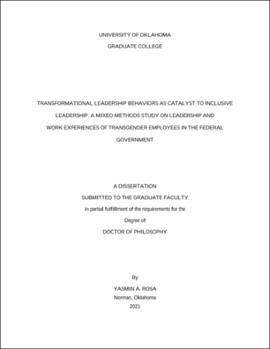| dc.description.abstract | Diversity and inclusion have been part of leadership research since the early 1980s. In 2011, President Obama signed Executive Order 13583 “Establishing A Coordinated Government-Wide Initiative to Promote Diversity and Inclusion in the Federal Workforce”. As a result, agencies incorporated management training modules in their strategic plans and suggest specific skills for an inclusive leader. Building upon the extant leadership literature, this study sets out to explore whether and to what extent transformational leadership behaviors can serve as a foundation for an inclusive leadership model. Furthermore, the study concentrates on the effects transformational leadership behaviors have on transgender employees’ job satisfaction, as well as their engagement, commitment to the organization, and turnover intention. The research employs mixed methods, analyzing quantitative and qualitative data to identify the influence leadership behaviors have on employees’ work experiences. For the quantitative analysis, the 2015 Federal Employees Viewpoint Survey (FEVS) was used to investigate the effects of transformational leadership on LGBT federal employees. The qualitative data was collected through semi-structured interviews with ten transgender federal employees who volunteered for the study. To reduce the quantitative data to a manageable number of variables, a series of factor analyses were performed on the main leadership factors (independent variables) as well as employment outcomes (dependent variables). Multivariate regression and logistic regression analyses were used to estimate the transformational leadership effects on four employment outcomes (job satisfaction, engagement, commitment, intention to leave). Interaction terms (between leadership factors and LGBT status of employees) were included in all four models to evaluate whether the leadership factors have unique impacts on LGBT employees, as compared to their heterosexual counterparts. For the qualitative analysis, the researcher used thematic analysis applying previously identified (a priori) codes. These pre-selected codes represent each of the attributes categorized in the literature as transformational and inclusive leadership behaviors. Using the qualitative analysis (MAXQDA) system’s code and ‘in-vivo’ functions, sections of dialogue consistent with the theoretical framework were extracted, thoroughly organized and highlighted using color-coded coding strips to emphasize the coded text. Several fundamental themes (e.g., supportive, fair, open, trust) related to transformational leadership as well as the new inclusive quotient (New IQ) emerged from this analysis. Findings from the regression models revealed that transformational leadership traits are positively related to employees’ overall job satisfaction. Moreover, it showed that the effects of transformational leadership relationship were higher on the LGBT employees. The findings were similar for commitment and engagement for the transformational leadership behaviors. The qualitative results broadly supported the findings from the quantitative analyses in terms of the transformational leadership behaviors. Limitations to the study included the availability of data on transgender employees, the structure of the survey, the secondary data set and the scarcity of volunteers to interview. Broader LGBT community outreach is suggested for future studies. The results of this research confirm that transformational leadership behaviors are favorable for positive organizational outcomes and conducive to inclusion. Additionally, the findings support the need for a review of leaders and managers’ competencies and inclusion training programs. The results also call for more research regarding transgender employees and inclusive work environments. | en_US |
